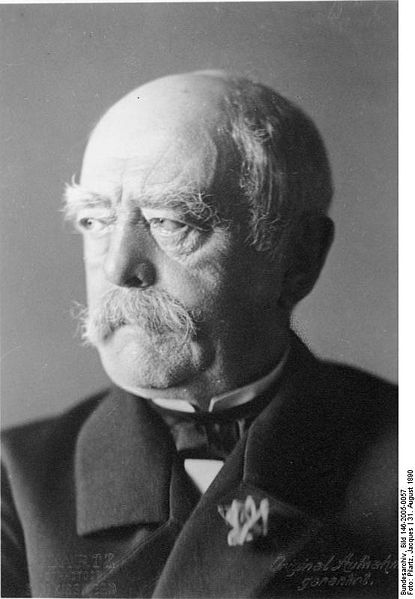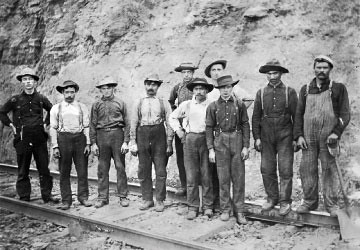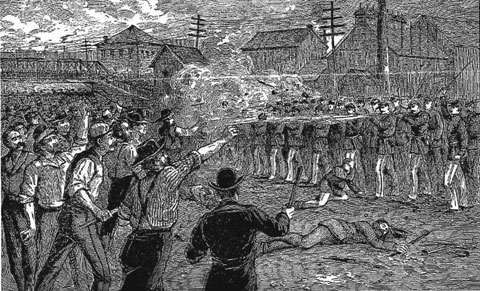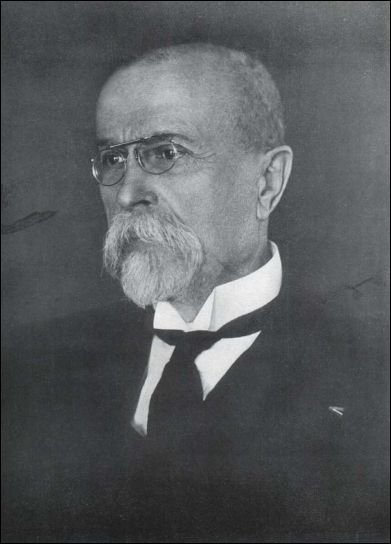Wars of Imperialism - 1878-1887
The year 1878 marked the conclusion of a period of peace in Europe originated from the Congress of Vienna, that had prevented general European Wars, and restricted them to local conflicts, such that had existed during the Franco-Prussian War. The Holy Alliance by the conclusion of the 1870s, stood as the most powerful entity in European Politics, with the entering of the Russian Empire the year before. Russia, who was also closely tied with defeated France, created the final bloc in what seemed to be a surrounding maneuver by the American-Austrian Alliance, around the Germans. At the time, President-Chancellor Otto van Bismark, the leader of the conservative movement that opposed the Constitutionalism on the Empire imposed in previous years, was ignorant of the scenario. On May 2nd, Bismark gave a violently jingoistic ultra-nationalist speech, titled "Blood and Iron" within the halls of the German Assembly, and called for an action of war against Austria to restore German Bohemians to the unified state. Unaware of the Russo-Austrian agreement, Bismark put forth a declaration of war, which was harshly opposed in the Assembly. Leftists and Socialists who opposed the Monarchy were able to stall the Conservative motion, but the effort was wasted. When word reached the Hapsburg Monarchy on the 17th of May, the Austrians delivered a declaration of war to the German embassy, and called upon its allies.
President-Chancellor Otto van Bismark, widely considered the worst German leader in its history.
The French saw the declaration of war as a second opportunity, and the Radical National Assembly under Bonaparte parties, put forth a simular declaration, intent on declaring a separate war for Alsace and Lorraine, and more northern German provinces, to block Baltic Trade by the Germans. By the 20th of May, The Republic of France, The Russian Empire, The Austrian Empire, the Papacy, the Kingdom of Belgium, the Kingdom of Porgugal, the Duchy of Lucca, the King of Tuscany, and the King of Greece had all entered a state of war against the Germans. Initial German Advances into Poland were halted by the French and Austrian invasion five days succeeding the declarations of war. Both the Austrians and the French poured over the border, with nearly 100,000 troops in Silesia, and over 200,000 French forces in Northern Germany.
Situation in Germany on May 21st.
Throughout summer, a string of Austrian Victories and the Russian Counter-Invasion through the German war machine to dust. Germany found its cities occupied in all directions, with insufficient forces to fight them off. By October, the first Austrian troops had marched into Berlin, and pacification of the region was finished in under three weeks. Austrian Forces felt betrayed by Maximilian however, whom had pledged naval support to the Austrian Forces. After a brief German victory in the Mediterranean over the miniscule American fleet, American reinforcement became sufficiently unnecessary, and wasteful, especially after the success of the tri-invasion of Germany. The action soured relations to almost hostile limits, when the
HMS Oregon fired on a Austrian port after a weapons malfunction. By the time the Austrians reached Berlin, the Hapsburg Monarchy declared the Holy Alliance invalid on the day of supposed treaty revision, leaving American forces temporarily isolated. Following the international plunge of the stock market in the days following the declaration of war, the economic situation in America became dire, and it was not until the abolition of the Holy Alliance (along with the American war subsides) did a recovery process ignite.
Austrian Troops occupy Berlin
At home, the war had shown a brutal, harsh type of warfare, one of which the Socialists used for their advantage. Due to a wide-spread switch in public favor, the United States began dragging behind in the Scramble for Africa, and was forced to abort several colonies as it was encircled by French and British colonials systems. The Socialists turned the tide on what had once been a jingoistic fervor into a pro-isolationist populace, by utilizing the newly freed press media system implemented by the crown itself. By the conclusion of the year 1878, the Socialists were assumed (as they were technically illegal), to control nearly 10% of the Upper-House. The Pro-War sympathizers were saved when the media from Europe halted after the Treaty of Paris, on May 2nd, nearly a year after the conflict began.
The treaty was an astounding victory for the Russians, French, and Austrians, all of whom successfully pressed their claims, which included, Poland, East Prussia, Schlesien, Alsace and Lorraine, and part of the Northern Bank of the Rhine.
Europe, following the Treaty of Paris
As attention was finally diverted away from Europe after the ratification of the treaty, focus re-routed itself to Africa, where the Americans had been pinned in by a combined Anglo-French movement. In 1880, William Fry, the commander of the American Colonial Force, was seeking possible unclaimed lands in Africa to be welcomed in by both American and European immigrants under the American Flag. The 9,000 man force was subsequently ambushed by a equal force of Muslims, under Umaru bin Ali, the Sultan of Sokoto. After realizing he had marched near the actual city of Sokoto, he quickly issued a declaration of war in the midst of the ambush (of which the King never questioned), and counter-attacked, defeating the forces at their own capital.
William and newly arriving colonial forces ignited the occupation of Sokoto in early 1881, where harsh conditions and constant raids made progression difficult. Eventually, after weeks of stalling, the American Golonel moved 6,000 men to the eastern portion of the nation in late 1801, where he unknowingly launched an assault on a enemy force with twice his numbers. After fierce fighting, American soldiers pushed back the African horde, but not before the death of Fry, who was killed by a enemy sabre.
General Fry sketched dying at the hands of Sokotans, depicted as Native Americans, a people of which American's already had a burning hostility towards. New York Times, 1883.
The war in Sokoto concluded with a clear American Victory in October 1882, ending the expensive two year conflict with a total annexation of the Emirate of Sokoto to the American Military-Governor, Steven Howards.
The conclusion of the war in Sokoto brought a brief end to the conflicts in Africa, and returned focus to the American Continent where major Industrial and Economic events were brewing. The first of which, was the final completion of the inter-continental railway, funded, produced, and constructed by the Railroad Mega-Company, Bennet & Company. Having received funding by the crown in 1879 in accordance with the
Edict of Springston, Bennet & Co. had nearly a total monopoly on the entire American railroad system, making it the most wealthy and largest corporation in the Western Hemisphere. Challenged only by Royal Steel, Bennet & Co. laid down nearly 400 Million Dollars in track, and received nearly twice that amount in total revenue. Between 1881 and 1890, it would be the only company to hold more then 800 Million Dollars in total assets.
Industrial Workers laying track in Oregon for Bennet & Company --- 1883.
Beyond that however, Bennet & Company had desires away from the American continent, and saw the ability to make great profit from a agrarian land with little transport capacities. Forming a sub-division, Bannet & Son, the company had the desire to begin to ship several hundred workers to Africa, with labor support from the local population. The thought of forced transport greatly angered the workforce, many of whom were members of the Socialist Unions. In late 1883, the workers ignited a great strike that halted nation wide production, and forced the Company to call in for state assistance. Maximilian, who refused to show any sign of weakness, marched down to the striking force with "Union-Busters" and opened fired on the crowd. Realizing that the King could freely kill who he pleased, the workers returned to their workplaces, refusing to join the 7 brethren that had been killed in the massacre.
The conclusion of the great strike allowed the transfer of nearly 2,000 workers to Africa, many of whom began a trekking journey to unite the resource rich North, with the fertile Central-Africa, separated by the magnanimous Sahara desert. Construction began in Algeria, but it was not long after its commencement when the local workers came under raid from Saharan Tripoli's that believed their tribal land was being violated. Maximilian, believed to be in a bad mood, decided to declare war on Tripoli for such actions, though there was no proof that the raiders had any attachment to the Government of Tripoli.
Fearing for their own independence, Tunis quickly rushed to the aid of Tripoli, providing 20,000 troops in conjunction with Tripoli's 6,000. The American Colonial Force, now commanding near 90,000 troops in the entire region, sent 20,000 American Forces (many of whom were locals, trained and equipped by the Americans) into the invasion force. American forces first encountered resistance at Ghat, when a 9,000 American force was assaulted in traditional fashion by 17,000 Tunisians and Tripoli. After seizing a significant hill on the far right of the battlefield, American artillery was able to pound the incoming force with relative ease, as the more advanced infantry were able to defend such a hill with a series of new doctrines, that limited the Muslim capability to launch a full out assault. Eventually, after wearing down their opponent, a large Cavalry brigade flanked the opposing mob, and sent the enemy into full rout.
The Victory at Ghat was the decisive battle in the invasion of Tripoli, and by August of 1884, the majority of the nation had been occupied by American Forces. As General William Hardsfield (the victor of Ghat), prepared for the invasion of Tunis, assisted with a blockade of the state. War with Tunis brought about a renewed tension with the French Republic, who had invested heavily in Tunis. As negotiations between Richard Heartfeld, the Ambassador to France and the National Assembly begun, the court began to invest itself in a new project.
Richard Heartfeld, the Ambassador to France, would be instrumental in keeping out French Intervention in Tunis.
Richard Heartfield began a system of stalling tactics, watching International Events with great intrigue, and preparing for the moment where French vulnerability would allow American forces to properly invade Tunis. With tensions running high in Germany, Heartfield seized the opportunity to further provoke a Second Central European War. After sending a telegram to Berlin, the American Ambassador, Gregse Vadilosk, a Russian Immigrant, provided a false report to the German President, William von Hardesbur, that the Austrians had provided a threat of war. Following another fabricated border incident, Austria and Germany found themselves at war in 1885. The sudden shift of French attention allowed the invasion of Tunis to commence, most of which found itself occupied in the following year.
To the luck of von Hardesbur, the French and Russians were unable to intervene, and soon, the disciplined German troops won a string of victories along the borderline, eventually marching all the way to Vienna, encountering only two decisive battles, one in Bohemia, and the other in Venice. By the time Tunis had been annexed in 1886, and the institution and commission of 40 new Iron Clad War ships, the Germans had recaptured their old territory taken by the Hapsburgs, and even forced the annexation of Bohemia into the nation.
Europe and North Africa in 1887



























